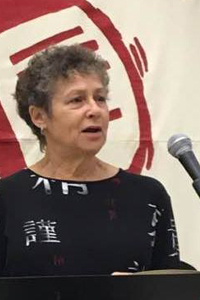MIA Editors: This is a tribute written by Celia Brown, Ron Bassman and Peter Stastny.
We mourn the loss of Darby, our friend, colleague, boss, comrade and inspiration, who passed way too soon from a devastating cancer and its treatment. As a team, the four of us had a lot of fun, conviviality and a mission transforming the mental health system in New York. We tried to improve the system from within, but the system was stronger than us.

Darby was always consistent and passionate in her leadership, as well as clear about the formidable obstacles ahead. She never trusted the system and tried to remain a thorn in its side, until the people running it saw her true colors, forced her out, and disbanded our team. Without Darby, peer specialists would not have become established in NY as the first state in the nation. At the same time, she was highly skeptical about the potential of peer specialists actually being able to promote true transformation in a system that is still wedded to institutionalization, coercion and biological reductionism.
Only a few months ago the four of us had our first reunion after a number of years over zoom and Darby was already ailing, but pushing on. She remained engaged in the fight until virtually days before her passing and never abandoned the cause. It was heartbreaking to see how she struggled to keep up with her many engagements in spite of a perpetually worsening “chemo fog.”
Celia
It is with sadness as I reflect on the passing of Darby Penney. As I write about Darby, there is so much to impart because I either witnessed her greatness or was part of it in New York State. She was the first Director of Recipient Affairs for the Office of Mental Health. Darby was my supervisor in the 1990’s and early 2000s. As an effective policymaker, Darby created policies to support innovative peer-run programs in NYS. This was a time when non-peer clinicians believed that they were the only ones who can provide mental health services for people with psychiatric histories. Darby changed this perspective.
She strongly believed that peers, ex-patients and survivors can support and empower their fellow peers. Peer-run services were on the rise in New York State. Darby would tell you that if organizations did not have at least 51% of people with psychiatric histories on their board, then it wasn’t peer-run, but at best peer-driven. Darby supported truly peer-run services and training for us and by us. She secured funding in the development of peer-run services and projects. This wasn’t easy, but she never compromised. Darby wrote an article on this subject titled “How to Recognize A Peer-Run Program. ”
Working with Darby, we were able to use our mental health expertise, peer support and first-hand experience of surviving the mental health system to create meaningful change. The four of us developed monthly Self-help & Empowerment Seminars and created a space to foster hope and empowerment, where consumers, peers and survivors could share their voices. We facilitated discussions on topics such as self-help, peer support, advocacy and advance directives. In my role as Director of Peer Specialist Services, I provided support and technical assistance to peers in their new peer specialist civil service title positions. Darby insisted that state psychiatric hospital administrators interested in hiring peer specialists develop a plan on how they would support them and define their role in state outpatient clinics. She also demanded that peer specialists should always work with other peers in institutional settings in order to lessen co-optation and provide mutual support for each other. Darby provided a statewide training for peer specialists in collaboration with Shery Mead, who taught us concepts of mutual peer support, later known as Intentional Peer Support (IPS).
Ultimately, Darby regretted the way peer specialist positions were implemented in NY state facilities. She and Peter recently wrote a piece for MIA on this subject. I respected her feelings about it. However, I felt honored to be one of the first peer specialists because it gave me an opportunity to work and support my fellow peers. I hear Darby’s words on peer support reflected in conversations that I have with peers. She advocated for the integrity of peer support which had a profound effect on people with psychiatric histories and on peer specialists.
Darby’s legacy will live on. She was my friend, colleague, and helped me find my voice. The last conversation we had was organizing the INTAR Peer Support Webinar on November 22, which is going to be in her honor (www.intar.org). Rest in perfect peace. I will miss you, Darby.
Peter
Darby and I worked together on many things, not the least on the trove of suitcases from former patients that was discovered in an attic of Willard State Hospital. Oddly enough, when Darby called me about this treasure, I was already looking for artifacts in abandoned state hospitals with my cinematographer friend Lisa Rinzler. Darby invited us to work on a project reconstructing the lives of these long forgotten souls who were once owners of the suitcases and their contents. This work culminated in a major exhibition at the New York State Museum that traveled through the country, and a book, The Lives They Left Behind, which sold many thousand copies.
With Darby’s insight, careful editing and unswerving dedication to these long departed “peers” we worked hard to do justice to people whose lives were curtailed by misfortune and institutionalization. One of them, Lawrence Mocha, worked as the gravedigger of Willard for nearly 40 years and took careful measure of each dead body of his fellow patients. With Darby’s help we were able to put names on the numbered anonymous graves the institution provided for them. Darby kept this project alive for over 20 years, giving many public presentations, and developed a website open to all.
Without Darby, my career as a renegade psychiatrist would clearly have taken a different course. She was among the first, along with Celia and Ron, who opened my eyes to the importance of engaging on a collaborative and personal level with people who identified themselves as survivors of psychiatry and extreme distress. Our collaboration became one of many in this realm and my gratitude to Darby will never cease.
Ron
It is with a sad heart that I reflect and feel the loss of Darby. Twenty-five years ago, my life changed when I resigned from my position as Executive Director of a seven-county comprehensive mental health center and acknowledged publicly that I was a psychiatric survivor. No longer hiding my past, I met Darby and took a job in New York. Darby became my boss, and no better boss could I have had. We shared a passion to use what we knew to empower our fellow travelers and create meaningful change. Perhaps we were naïve in believing that we had genuine power and did not realize that we were subject to and buffeted by the ever-changing political winds. Darby provided the support, protection and guidance for me to grow into my new identity. And during that time our friendship developed. Both of us were avid readers and shared books that we enjoyed. Whenever I wrote an article, I would seek her opinion. I knew that her critique would be unvarnished and genuine. Darby was also an outstanding editor, and I don’t remember any instance of her not being available when she was asked to edit.
A highlight of my work at NYSOMH was when Darby connected me with Celia Brown and Peter Stastny.
The project that I found most rewarding was the work we did to bring self-help and empowerment to the outpatient departments of the 18 psychiatric facilities throughout New York State. In addition to teaching the possibilities of recovery and the benefits of self-help groups to patients and staff, we were authorized to evaluate services at psychiatric facilities and send our report to the NYSOMH commissioner. Throughout that time we learned much from each other and developed a friendship and respect for each other’s view that has endured. All of our numerous efforts were made possible through the administrative protection Darby skillfully exercised. We were able to work on and develop many programs until our influence became too much to be tolerated by the changing state politics. I suppose my most memorable and enlightening interaction with the Commissioner occurred when I was imploring him to do something about the abuses in the system. His response, “My job is to make sure that the governor is not embarrassed.” I thought to myself, that would never be the job for the four of us.
I could share many stories about Darby, but I will share only one. Darby and I were at Rockland State Hospital to do an evaluation of their outpatient services. We were sitting in the conference room with the administrators and the staff psychiatrists. One of the psychiatrists who was sitting next to me was whispering to me his criticism of the opinions of what was being expressed. I realized that since I was introduced at the beginning of the meeting as Dr. Bassman, he assumed that I was a psychiatrist. About halfway through the meeting, Darby excused herself to go to the rest room. To her surprise, the secretary told her that she could not use that rest room because it was only for staff, not patients. Darby used that encounter to help abolish staff-only restrooms throughout NY State. If my memory serves me, she won that battle.
Too many memories of fights won and lost to recount, but most notable to me was her friendship. For many, Darby was intimidating; her forthrightness, her intolerance for being fake or insincere or fawning, hid her soft heart, kindness, and vulnerability. For those of us who got to be close with Darby, who saw the many sides of a complex, caring good person, we will value the time spent with her. And for Peter, Celia, and I, we shared the best job we ever had — made possible by Darby Penney.
****
MIA Editors: We encourage MIA Readers to add their remembrances of Darby Penney through the Comments to this post.















It is a bitter way to learn of Darby’s passing but your eloquent piece warmed my heart deeply. She set a high bar for us peers working for state and national change. I had the pleasure of working with her a bit in the early years of the National Coalition. She was a brilliant and passionate force to be reckoned with. What a mind – clear as ice. What a heart – fierce and dedicated to advancing our values, priorities – our voice on all levels of the system. She moved mountains and inspired me to also hold a high bar when, for example, setting policy priorities and making sure that ever single word of the document was accurate and grammatically correct.
Sometimes she was rough around the edges – which I understand all to well – but she had a heart of gold and a deep compassion to make the world – and our dysfunctional “mental illness” system better. And she succeeded big time.
Thank you Darby for making a difference in the lives of so many people.
Thank you Celia, Ron & Peter for this informative and moving tribute to her.
Report comment
Definitely sad to hear of Darby’s passing. Our movement is not what it once was, despite all the new blood the social control industry keeps supplying us with. I will, speaking for myself, miss Darby’s presence at this event or that in the days ahead. Thank you very much Celia, Peter, and Ron for the tribute you’ve given to a wonderful personality.
Report comment
I was connected to Darby by Robert Whitaker a few years ago, when I just started writing an article about my involuntary and traumatic psych hospitalizations. After that, I emailed her whenever I needed help learning about New York State’s mental health laws or finding a source inside the state’s mental health system. She was always quick to respond, and always helpful, connecting me with people (deep) inside the system who were equally as helpful. I also found her book about old asylums extremely illuminating. I was amazed that, after emailing back and forth with her for so long, that she had written such an incredible book (one endorsed by Oliver Sacks!). Rest in peace Darby.
Report comment
Thank you for this lovely tribute everyone.
Sad to see another fighter gone.
As far as transformation of a system, not possible, because
of the very nature of the people that join those systems.
It comes down to like ilk.
A “disordered” in thought ilk. They really do not have the “insight” to transform who they are.
Report comment
Thank you for this tribute. I felt connected with Darby Penney without ever having the pleasure of direct meeting or collaboration. When I heard that she might have died, I delved into obituaries online to look for hers and found none. For a week I held out hope that what I’d heard was untrue; then it was confirmed, and I grieved a loss I felt bodily despite our bodies never having met.
I resonated with her discouragement about the recolonization of the peer movement. I had dared to hope that peer workers could power changing structures that dehumanize and harm. I grew despairing. I was rocked by her example of unflagging determination toward truth telling and commitment to the whole, the communities we live in and with whom we share accountability.
Her life was a gift that she shared generously with all. We’re left to discern how to generate culture and community that holds all life as precious. Current global north structures will dissolve alongside a truly solid movement that values life at its roots, compassion with the planet and all of us in it. Listening to the languages that we haven’t learned, the wisdom and soul crushing hurt that we’ve inherited, experienced, and transmitted.
Her clarity continues to reflect a hope that isn’t superficially optimistic but must be made real. We must link our sparks to co-create beyond where the arc of justice paused when Darby Penney died.
Report comment
This is a beautiful tribute and such a great history of what brought many of us who continue the fight to where we are. Darby has been an enormous influence on my own journey, advocacy, writing, and work. Her seemingly never-tiring gusto to fight no matter what people threw at her has provided me strength innumerable times. She was feisty and intimidating, sure – but that’s what made her so damned powerful and amazing. She was also incredibly sensitive, kind, generous, and funny. She made me laugh like few others could. Darby will forever hold a special place in my heart. Thanks for MIA and to Peter, Ron, and Celia for offering this space to honor an amazing woman.
Report comment
What a shock to hear of Darby Penney’s death — it is a huge loss for all who have ever thought that the mental health system should be and could be transformed. It is also a reminder that a “second generation” of activists, organizers, and psychiatric survivors is passing on…
From the many times I heard Darby in NARPA and other conferences starting in the 1990s, I remember her as one of the most dignified people I met, projecting an aura of quiet but formidable determination, a power that sprang from her deep convictions and vast knowledge. But I knew also that she could be fearsome! Darby was impressive, she had class. She did not desist from the task — she spoke forthrightly, labored tirelessly.
Report comment
Remembering you and your enormous contributions Darby. With love and much respect…
Report comment
“We tried to improve the system from within, but the system was stronger than us.”
Thank you to all involved in this piece and the work that needs to be done.
Report comment